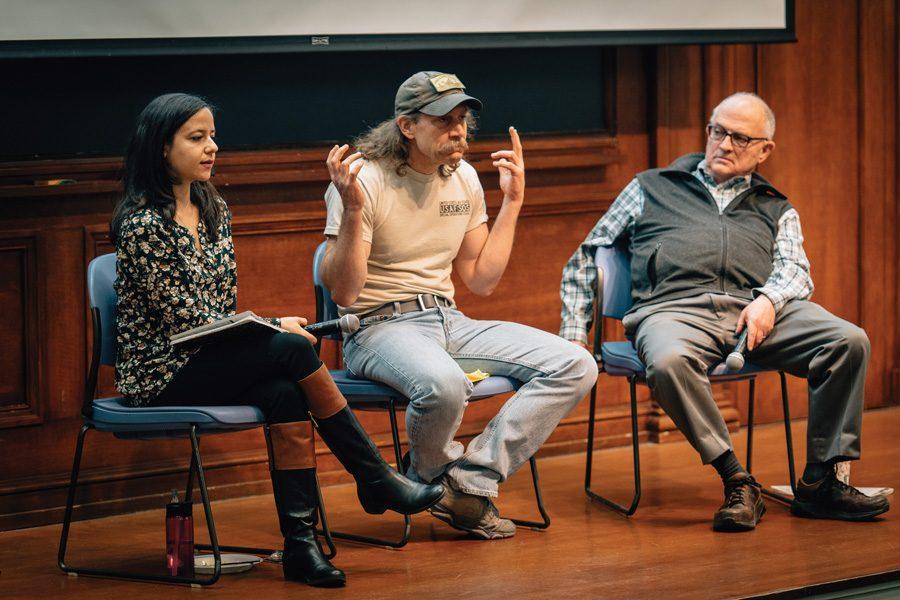Panelists discuss Trump’s Middle East foreign policy, impact on immigration
Noah Frick-Alofs/The Daily Northwestern
Prof. Will Reno discusses Middle Eastern immigration with NU students. The event Thursday night tackled the consequences of President Donald Trump’s actions on the opinions of people from the Middle East about the U.S.
February 17, 2017
Though President Donald Trump’s policies regarding the Middle East have caused controversy domestically, many people from the region have always felt unwelcome coming to the United States, panelists said at a talk Thursday.
The panel, held in Harris Hall in front of about 30 people, featured two professors and a Ph.D. candidate and addressed the effects of Trump’s actions on the Middle East. The event was organized by NU Middle East Review, a student publication centered on policy in the Middle East. Speakers included political science Prof. Will Reno, director of the African studies program, political science Ph.D. candidate Rana Khoury and history Prof. Michael Sherry.
The panel aimed to gather perspectives of experts who have interacted with individuals from the Middle East during Trump’s campaign and presidency, said Zain Syedain, the event’s coordinator.
“There’s obviously the reactions of people here,” the Weinberg junior told The Daily. “But you want to really hear about what people on the ground are feeling there because it’s easy to get caught up in the bubble.”
One of the main topics of discussion was Trump’s recent executive order on immigration. The order temporarily barred citizens of seven Muslim-majority countries from entering the United States and is currently blocked in court.
Although the order spurred protests and public backlash, Sherry said Trump’s travel ban is not much of a “break” from tradition. Sherry referenced similar historic legislation that barred immigration from Asia as well as southern and eastern Europe by creating quotas favoring Western Europeans.
“There is a long-standing tradition of erratic American action to bar various kinds of foreigners from entering into the United States,” he said.
The seven countries specified in Trump’s executive order are also the same countries that former President Barack Obama flagged as requiring stricter travel regulations for security purposes, Sherry said.
Khoury, who completed fieldwork in Jordan two months ago, said many refugees from there were not “hopeful” about coming to the United States, even before Trump was selected as the Republican presidential candidate.
“They had their sights set on Europe where there are more generous resettlement policies,” she said. “Keeping that in perspective, we weren’t that welcoming in the first place.”
However, the recent immigration ban differs from past foreign policy, Sherry said. In addition to being an intensified version of Obama’s policies, Trump’s action is an executive order, which gives it a “more unilateral and impulsive quality,” he said.
Weinberg junior Sophie Chen, who attended the event, said Trump’s impulsiveness worries her. The panelists also discussed the lack of predictability of Trump’s future policies, and Chen said she felt they seemed “just as confused” as she was in regard to anticipating what other decisions Trump could make.
“It’s concerning that there is no precedent and no prediction,” Chen said.
Despite the concerns that arose as a result of the panel, Syedain said he hoped the event would engage students by sharing the perspectives of people outside of the United States.
“There are so many things that are happening domestically in the U.S. that have captured people’s attention,” Syedain said. “And while all these things are extremely important, there is a wider world view that we need to take.
Email: [email protected]
Twitter: @JuliaEsparza10


